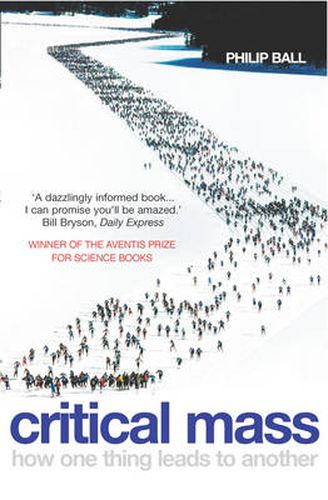Readings Newsletter
Become a Readings Member to make your shopping experience even easier.
Sign in or sign up for free!
You’re not far away from qualifying for FREE standard shipping within Australia
You’ve qualified for FREE standard shipping within Australia
The cart is loading…






Are there “natural laws” that govern the ways in which humans\nbehave and organize themselves, just as there are physical laws\nthat govern the motions of atoms and planets? Unlikely as it may\nseem, such laws now seem to be emerging from attempts to bring the\ntools and concepts of physics into the social sciences. These new\ndiscoveries are part of an old tradition. In the seventeenth\ncentury the philosopher Thomas Hobbes, dismayed by the impending\ncivil war in England, decided that he would work out what kind of\ngovernment was needed for a stable society. His solution sparked a\nnew way of thinking about human behavior in looking for the\n“scientific” rules of society. Adam Smith, Immanuel Kant,\nAuguste Comte, and John Stuart Mill pursued this idea from\ndifferent political perspectives. But these philosophers lacked the\ntools that modern physics can now bring to bear on the matter.\nPhilip Ball shows how, by using these tools, we can understand many\naspects of mass human behavior. Once we recognize that we do not\nmake most of our decisions in isolation but are affected by what\nothers decide, we can start to discern a surprising and perhaps\neven disturbing predictability in our laws, institutions, and\ncustoms. Lively and compelling, Critical Mass is the first\nbook to bring these new ideas together and to show how they fit\nwithin the broader historical context of a rational search for\nbetter ways to live.
\n\n
$9.00 standard shipping within Australia
FREE standard shipping within Australia for orders over $100.00
Express & International shipping calculated at checkout
Stock availability can be subject to change without notice. We recommend calling the shop or contacting our online team to check availability of low stock items. Please see our Shopping Online page for more details.
Are there “natural laws” that govern the ways in which humans\nbehave and organize themselves, just as there are physical laws\nthat govern the motions of atoms and planets? Unlikely as it may\nseem, such laws now seem to be emerging from attempts to bring the\ntools and concepts of physics into the social sciences. These new\ndiscoveries are part of an old tradition. In the seventeenth\ncentury the philosopher Thomas Hobbes, dismayed by the impending\ncivil war in England, decided that he would work out what kind of\ngovernment was needed for a stable society. His solution sparked a\nnew way of thinking about human behavior in looking for the\n“scientific” rules of society. Adam Smith, Immanuel Kant,\nAuguste Comte, and John Stuart Mill pursued this idea from\ndifferent political perspectives. But these philosophers lacked the\ntools that modern physics can now bring to bear on the matter.\nPhilip Ball shows how, by using these tools, we can understand many\naspects of mass human behavior. Once we recognize that we do not\nmake most of our decisions in isolation but are affected by what\nothers decide, we can start to discern a surprising and perhaps\neven disturbing predictability in our laws, institutions, and\ncustoms. Lively and compelling, Critical Mass is the first\nbook to bring these new ideas together and to show how they fit\nwithin the broader historical context of a rational search for\nbetter ways to live.
\n\n